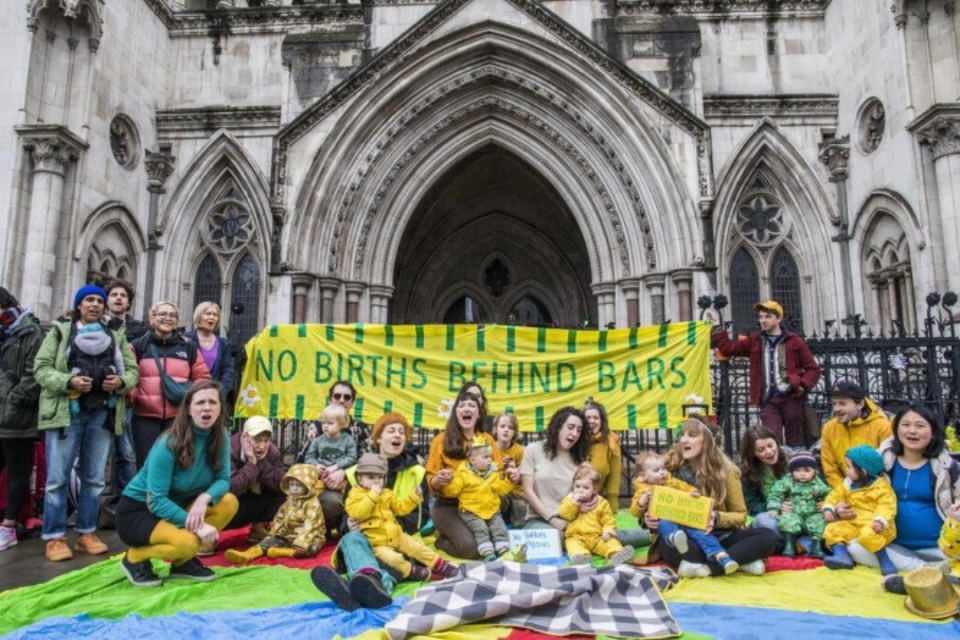In recent years there has been a concerted effort to raise awareness about the plight of pregnant women and birthing people in prison settings, following the tragic death of two babies. As a follow-up to a previous article, Janey Starling from Level Up shares an update on the campaign and how midwives may get involved.
_________________________________________________
Level Up are campaigning for an end to the imprisonment of pregnant women – and if you’re a midwife, we need your help.
Our campaign launched after the deaths of two babies inside prisons in 2019 and 2020. Rianna Cleary and Louise Powell, gave birth inside prison without medical assistance and their babies, Aisha and Brooke, died as a result.
Since then, Level Up has worked with women who were pregnant in prison, midwives like Dr Laura Abbott and Maria Garcia De Frutos, legal professionals, charities, academics and a protest group of mums and babies called No Births Behind Bars (pictured above), to campaign for an end to imprisonment of pregnant women.
Prison will never be a safe place to be pregnant
Prison will never be a safe place to be pregnant. Pregnant women in prison are seven times more likely to suffer a stillbirth and more than twice as likely to have a premature birth. Over one in five pregnant women miss midwifery appointments. And since the harrowing baby deaths of Aisha Cleary and Brooke Powell, the NHS, Prison Ombudsman and Ministry of Justice have all declared all pregnancies in prison as “high-risk”.
The Royal College of Midwives have spoken out to say “prison is no place for pregnant women”, and the Royal College of Obstetricians and Gynaecologists have emphasised the need for non-custodial alternatives for pregnant women.
The solution
Pregnant women end up in prison because courts send them there – so this is where both the problem and the solution are. Courts have no formal duty to even consider a woman’s pregnancy when making a decision on whether to send a woman to prison – which means that judges and magistrates are unknowingly sentencing pregnant women to a high-risk pregnancy or stillbirth.
Ultimately, the responsibility sits with the government. But the Sentencing Council have a huge role to play too, which is why we’re targeting them first.
The Sentencing Council
The Sentencing Council, who are responsible for overseeing all court sentencing guidelines in England and Wales, have the power to change the way pregnant women are sentenced.
Last year, Level Up teamed up with No Births Behind Bars to write an open letter to the Sentencing Council, which was signed by the UK’s leading maternity professionals. We’ve also kept up the momentum on the campaign with media coverage in places like Sky News, Cosmopolitan and the BBC and baby protests outside the Ministry of Justice, Royal Courts of Justice and the two prisons where both babies died.
And it looks like the Sentencing Council is finally listening. They’ve already proposed measures to make pregnancy a ‘mitigating factor’ in sentencing. And last week, they also put forward strong proposals that change the way pregnant women are sentenced, which will reduce the use of imprisonment for pregnant women. The proposals finally acknowledge that prison harms both mothers and babies, and that “courts should avoid the possibility of an offender giving birth in prison.”
These changes would make a massive, intergenerational difference to the lives of thousands of mums and babies swept up in the criminal justice system. They are a huge win for our campaign. But they are not guaranteed – the Sentencing Council is currently consulting on them, and we need to rally lots of positive voices in the consultation to get these changes over the line. The professional opinions of midwives will carry huge weight in this consultation.
Get involved in the campaign to end the imprisonment of pregnant women
The campaign has only reached this point due to the power of mothers and midwives – and I know it’ll be the power of mothers and midwives that secure this lasting change. If hundreds of midwifery professionals write to the Sentencing Council, judges simply cannot disagree! The deadline is 21 February 2024.
Your support is critical to securing this change. If you want to get involved and lend your voice as a midwifery or maternity professional, here are two actions you can take today:
- Sign the petition
- Email us at [email protected] with ‘Midwife support’ in the subject line for our briefing on the Sentencing Council consultation and more detailed information on what you can do.



